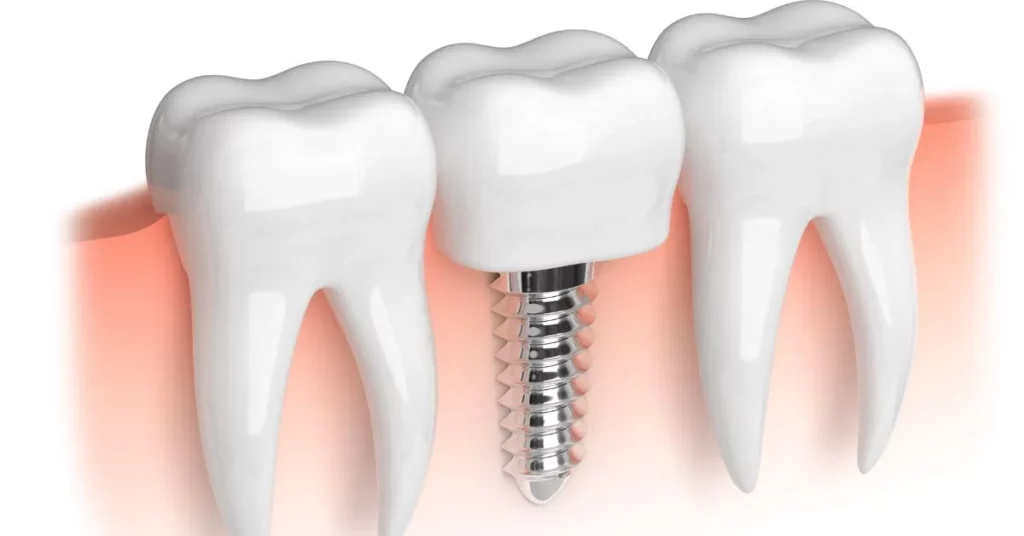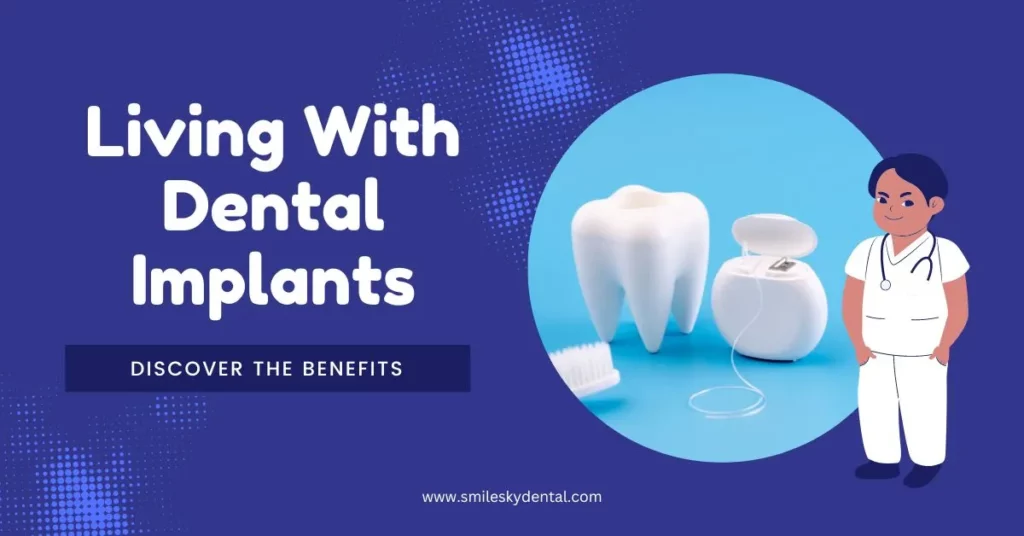When living with dental implants, the benefits are manifold. Not only will you have a more natural look and feel to your teeth, but they are also designed to last for many years if taken care of properly.
Benefits Of Dental Implants
Living with dental implants is more practical. They can help to improve both your physical and emotional well-being. From improved dental hygiene to less maintenance for your teeth, and an overall boost in confidence. Dental Implants are an excellent choice for those who want an improved smile without the hassle or expense of traditional braces or dentures.
Low Risk Of Decay And Disease
Additionally, there is less chance of decay and disease that can come from traditional braces or dentures. This is because the implant is placed directly into your jawbone and secured with screws. This improves your overall dental health.
Less Maintenance
Dental implants are also highly convenient. You do not have to worry about nightly maintenance like you do with dentures or braces. All that is necessary is proper oral hygiene and regular visits to your dentist for checkups and cleaning.
Freedom To Eat
Furthermore, you don’t have to avoid certain food or remove your implant to enjoy some delicacies. You can eat whatever you like with your implants.
Aesthetic Boost

They also give you a boost as well. This can be especially beneficial for those who are embarrassed by their missing teeth or self-conscious about their smile. With an implant, you will be able to smile confidently and with ease of mind knowing that your appearance is improved.
Overall, living with dental implants can be an excellent choice for restoring your oral health as well as providing a beautiful, confident smile. While dental implants require proper care and maintenance, with the right advice and support, you can enjoy the benefits of your implants for years to come.
Before Dental Implant Surgery- How To Prepare Yourself
Before dental implant surgery, it is important to discuss the procedure and your individual needs with your dentist. They will be able to help you determine if dental implants are right for you. As well as provide information on any potential risks or complications that could arise before, during, and after the surgery.
By being fully informed before going into the procedure, you can make sure that you are making the best decision for your dental health and overall well-being. Knowing the process can help you prepare for the surgery.
Dental Implant Options
3 in 1 dental implants
3 in 1 dental implants are a great option for those who are looking for an efficient and permanent solution to missing teeth. They typically consist of 3 parts:
-
- The Implant Itself
-
- An Abutment (a connector piece)
-
- A crown
This combination of components allows for a more secure, stable fit than traditional implants, as well as providing an even better aesthetic result. If you have previously failed with traditional implant procedures, the 3 in 1 dental implant may be a great way to increase the success rate.
Lower Jaw Implants

Lower Jaw Implants are an increasingly popular option for those looking to replace missing teeth. They are secure and stable, and they can be used to replace both individual teeth and the entire arch of missing teeth. The implant is placed directly into the bone of your lower jaw, providing a strong foundation for the new tooth and protecting nearby teeth and gums from damage or decay.
Moreover, lower jaw implants can improve your overall dental health by promoting better oral hygiene and preventing diseases that can be caused by traditional braces or dentures.
Upper Jaw Implants
Living with upper or lower jaw implants can provide many benefits, from improved dental health to greater confidence in your smile. Upper or lower jaw implants can provide a healthy, confident smile with the right care.
Once your upper or lower jaw implant is in place, there are some important tips to help prolong the life of your implants. Make sure to brush and floss regularly and be sure to schedule regular check-ups and cleanings with your dentist.
Bone Graft With Implant Placement
Bone graft with implant placement can be used to strengthen the bone around an implant for a more secure and stable fit or to fill gaps in bone caused by tooth loss. In this procedure, the bone is taken from another part of your body (typically the chin bone) and placed into the area where you would like to have an implant installed.
The bone is then allowed to heal and fuse with the bone in your jaw before a dental implant can be placed. This process helps ensure that your implants will remain secure and stable for years to come, improving your smile’s function and aesthetics.
Bone grafting may also be necessary to prepare for multiple implants; grafted bone can increase bone density where implants are to be placed and help ensure that each implant is secure.
Dental Implants FAQs
If you’re still unsure about dental implants, here are some answers to the most common dental implant FAQs:
How many stitches after dental implant are required?
Generally, most procedures require between 5-7 stitches to close the incision site. The number of stitches needed after a dental implant procedure will depend on the complexity of your case and the type of implant that is being used.
Can you feel dental implants?
In most cases, No. Since dental implants are made of titanium, a metal that is compatible with human bone and can easily integrate into the jawbone, you should not be able to feel them once they have been implanted. However, if the implant becomes loose or damaged in any way, you may experience some discomfort.
How durable are dental implants?
Dental implants can last for many years when properly placed and cared for. In fact, with good oral hygiene habits and regular visits to the dentist, they can last a lifetime.
Can a dental implant be replaced?
Yes, a dental implant can be replaced. In the event that an implant becomes loosened or damaged in any way, your dentist can easily remove it and replace it with another one.
Can dentures be converted to implants?
Yes, in some cases dentures can be converted to dental implants. This can often provide a more secure fit and can be much less painful than traditional dentures. However, the success of this conversion depends on your individual oral health needs and the condition of your jawbone.
Can you eat before dental implant surgery?
Yes, you can eat before your dental implant surgery, although it is recommended to stick with light and nutritious meals such as vegetables, fruits, and lean proteins. Avoid any food that may be difficult to chew or can stick to your teeth. It is also important to stay hydrated before the procedure, so drink plenty of fluids. Most importantly, avoid any food or beverages that can stain your teeth and can cause discoloration of the gums.
Can you get dental implants if you already have dentures?
Yes, in some cases you can get dental implants even if you already have dentures. Depending on the condition of your jawbone and oral health needs, it may be possible to use existing dentures as a base for implant-supported prostheses.
Can you go from dentures to implants?
Yes, it is possible to go from dentures to implants. This can provide a more secure and comfortable fit than traditional dentures since they are held in place by the jawbone rather than adhesives or other prosthetics.
With proper care and regular visits to the dentist, an implant can last for many years, making it an investment in both your present and future dental health. That’s precisely where our team at Smile Sky Dental comes in – we’re here to provide you with exceptional care and guidance throughout your dental implant journey.


